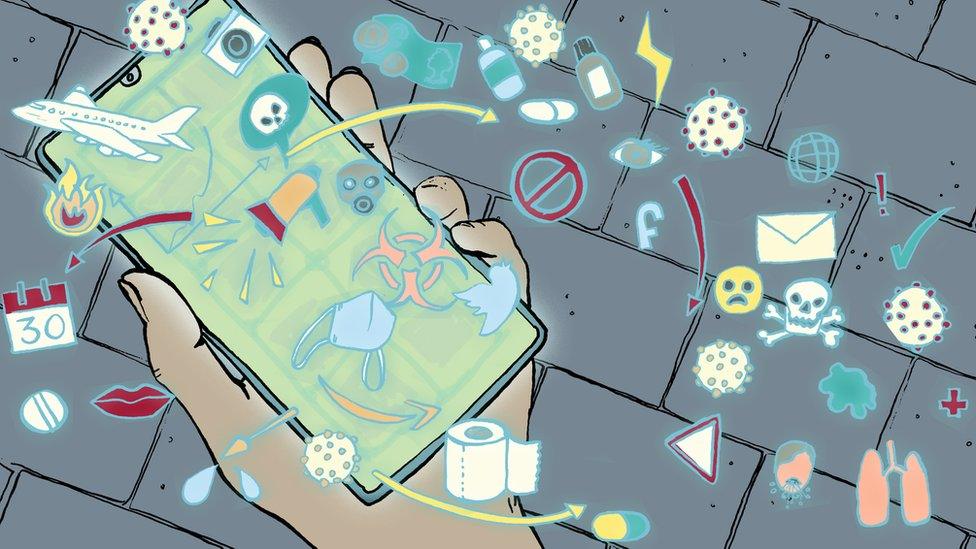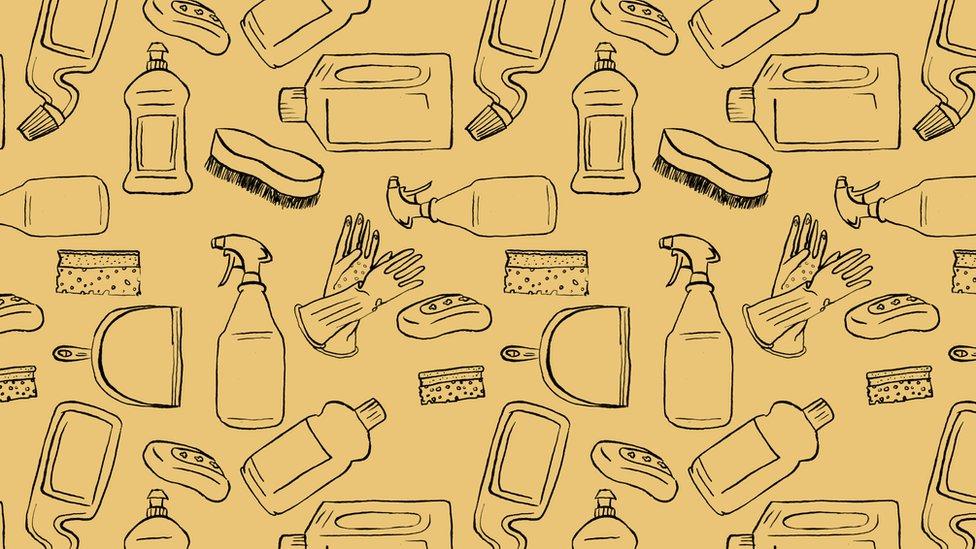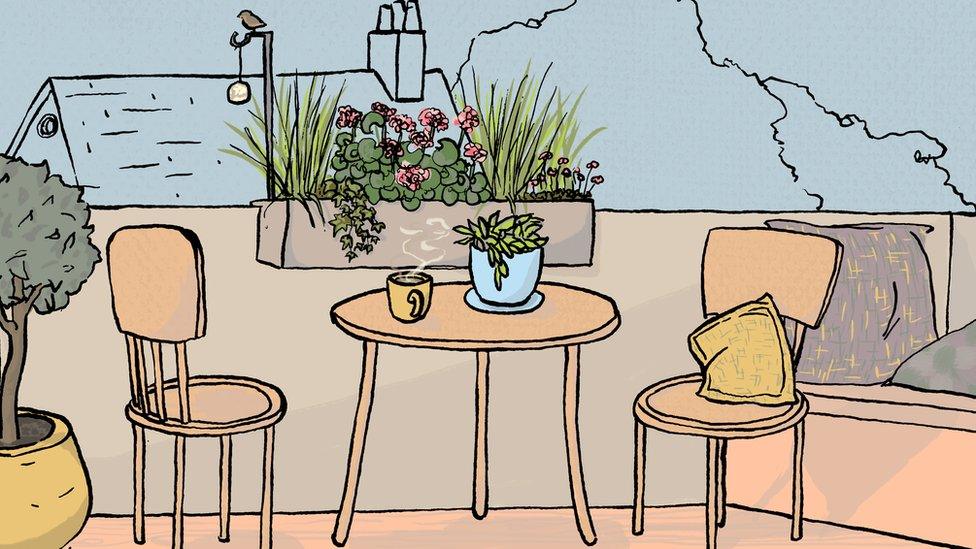Coronavirus: How to protect your mental health
- Published

Coronavirus has plunged the world into uncertainty and the constant news about the pandemic can feel relentless. All of this is taking its toll on people's mental health, particularly those already living with conditions like anxiety and OCD. So how can we protect our mental health?
Being concerned about the news is understandable, but for many people it can make existing mental health problems worse.
When the World Health Organization released advice on protecting your mental health during the coronavirus outbreak, external, it was broadly welcomed.
As Anxiety UK's Nicky Lidbetter explains, the fear of being out of control and unable to tolerate uncertainty are common characteristics of many anxiety disorders. So it's understandable that many individuals with pre-existing anxiety are facing challenges at the moment.
"A lot of anxiety is rooted in worrying about the unknown and waiting for something to happen - coronavirus is that on a macro scale," agrees Rosie Weatherley, spokesperson for mental health charity Mind.
So how can we protect our mental health?
Limit the news and be careful what you read
Reading lots of news about coronavirus has led to panic attacks for Nick, a father-of-two from Kent, who lives with anxiety.
"When I'm feeling anxious my thoughts can spiral out of control and I start thinking about catastrophic outcomes," he says. Nick is worried about his parents and other older people he knows.
"Usually when I suffer I can walk away from a situation. This is out of my control," he says.
Having long periods away from news websites and social media has helped him to manage his anxiety. He has also found support helplines, run by mental health charities such as AnxietyUK, useful.
Limit the amount of time you spend reading or watching things which aren't making you feel better. Perhaps decide on a specific time to check in with the news
There is a lot of misinformation swirling around - stay informed by sticking to trusted sources of information such as government and NHS websites
Tips on managing anxiety and OCD during the coronavirus pandemic
Have breaks from social media and mute things which are triggering
Alison, 24, from Manchester, has health anxiety and feels compelled to stay informed and research the subject. But at the same time she knows social media can be a trigger.
"A month ago I was clicking on hashtags and seeing all this unverified conspiracy rubbish and it would make me really anxious and I would feel really hopeless and cry," she says.
Now she is careful about which accounts she tunes into and is avoiding clicking on coronavirus hashtags. She is also trying hard to have time away from social media, watching TV or reading books instead.
Mute key words which might be triggering on Twitter and unfollow or mute accounts
Mute WhatsApp groups and hide Facebook posts and feeds if you find them too overwhelming

A SIMPLE GUIDE: How do I protect myself?
AVOIDING CONTACT: The rules on self-isolation and exercise
HOPE AND LOSS: Your coronavirus stories
LOOK-UP TOOL: Check cases in your area

Wash your hands - but not excessively
OCD Action has seen an increase in support requests from people whose fears have become focused on the coronavirus pandemic.
For people with OCD and some types of anxiety, being constantly told to wash your hands can be especially difficult to hear.
Allow X content?
This article contains content provided by X. We ask for your permission before anything is loaded, as they may be using cookies and other technologies. You may want to read X’s cookie policy, external and privacy policy, external before accepting. To view this content choose ‘accept and continue’.
For Lily Bailey, author of Because We Are Bad, a book about living with OCD, fear of contamination was one aspect of her obsessive compulsive disorder. She says the advice about hand washing can be a huge trigger for people who have recovered.
"It's really difficult because I now have to do some of the behaviours that I've been avoiding," says Bailey. "I'm sticking to the advice really rigidly but it's hard, considering that for me, soap and sanitiser used to be something comparable to an addiction."
Charity OCD Action says the issue to look out for is the function - for example, is the washing being carried out for the recommended amount of time to reduce the risk of spreading of the virus - or is it being done ritualistically in a specific order to feel "just right"?

Bailey points out that for a lot of people with OCD, getting better means being able to leave the house - so self-isolating can present another challenge.
"If we're forced to stay at home, we have lots of time on our hands, and boredom can make OCD worse," she says.
Stay connected with people
Staying in touch with those you care about will help to maintain good mental health during long periods of self-isolation.
"Agree regular check-in times and feel connected to the people around you," says Weatherley.
Strike a balance between having a routine and making sure each day has some variety.
For some people it might end up actually feeling like quite a productive or restful period. You could work through your to-do list or read a book you'd been meaning to get to.

Avoid burnout
With weeks and months of the coronavirus pandemic ahead, it is important to have down time. Mind recommends continuing to access nature and sunlight wherever possible. Do exercise, eat well and stay hydrated.
AnxietyUK suggests practising the "Apple" technique to deal with anxiety and worries.
Acknowledge: Notice and acknowledge the uncertainty as it comes to mind.
Pause: Don't react as you normally do. Don't react at all. Pause and breathe.
Pull back: Tell yourself this is just the worry talking, and this apparent need for certainty is not helpful and not necessary. It is only a thought or feeling. Don't believe everything you think. Thoughts are not statements or facts.
Let go: Let go of the thought or feeling. It will pass. You don't have to respond to them. You might imagine them floating away in a bubble or cloud.
Explore: Explore the present moment, because right now, in this moment, all is well. Notice your breathing and the sensations of your breathing. Notice the ground beneath you. Look around and notice what you see, what you hear, what you can touch, what you can smell. Right now. Then shift your focus of attention to something else - on what you need to do, on what you were doing before you noticed the worry, or do something else - mindfully with your full attention.

How have you been affected by coronavirus? Share your experiences by emailing haveyoursay@bbc.co.uk, external.
Please include a contact number if you are willing to speak to a BBC journalist. You can also contact us in the following ways:
WhatsApp: +44 7756 165803
Tweet: @BBC_HaveYourSay, external
Send pictures/video to yourpics@bbc.co.uk, external
Please read our terms & conditions and privacy policy